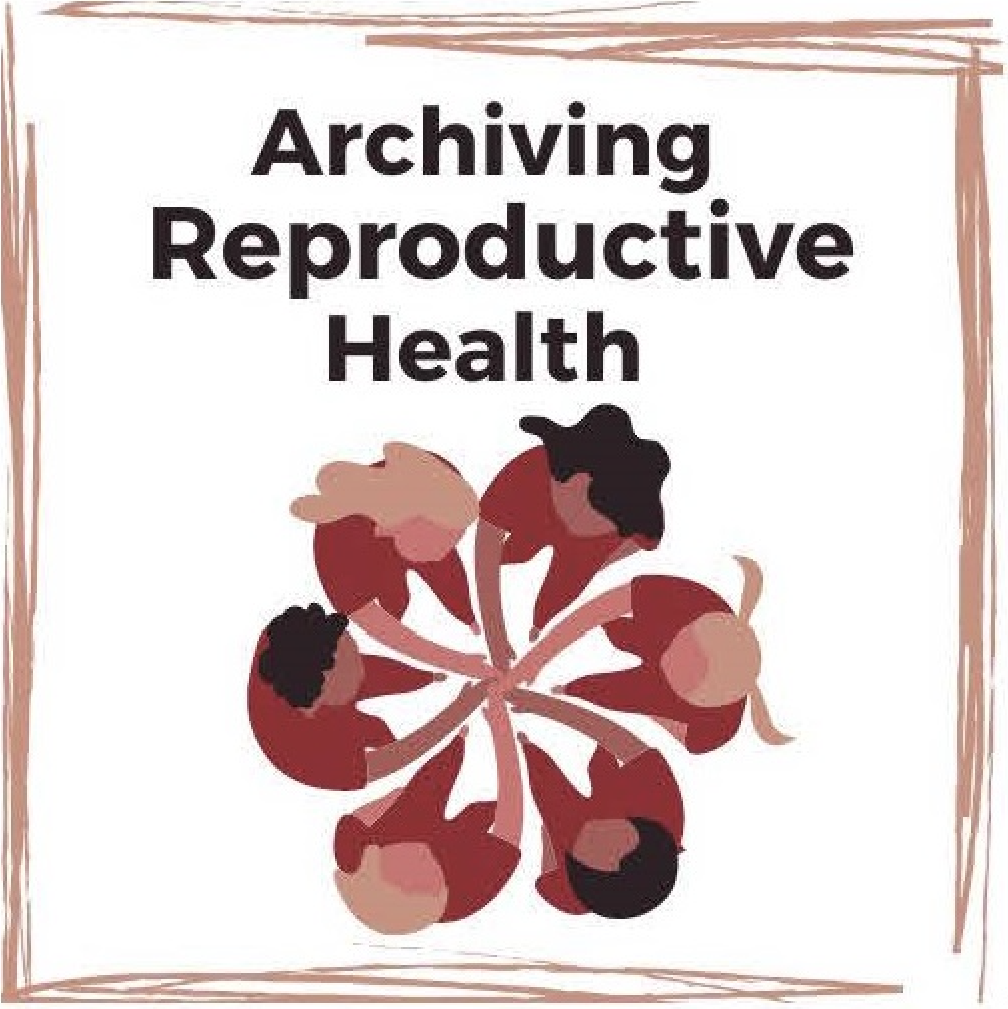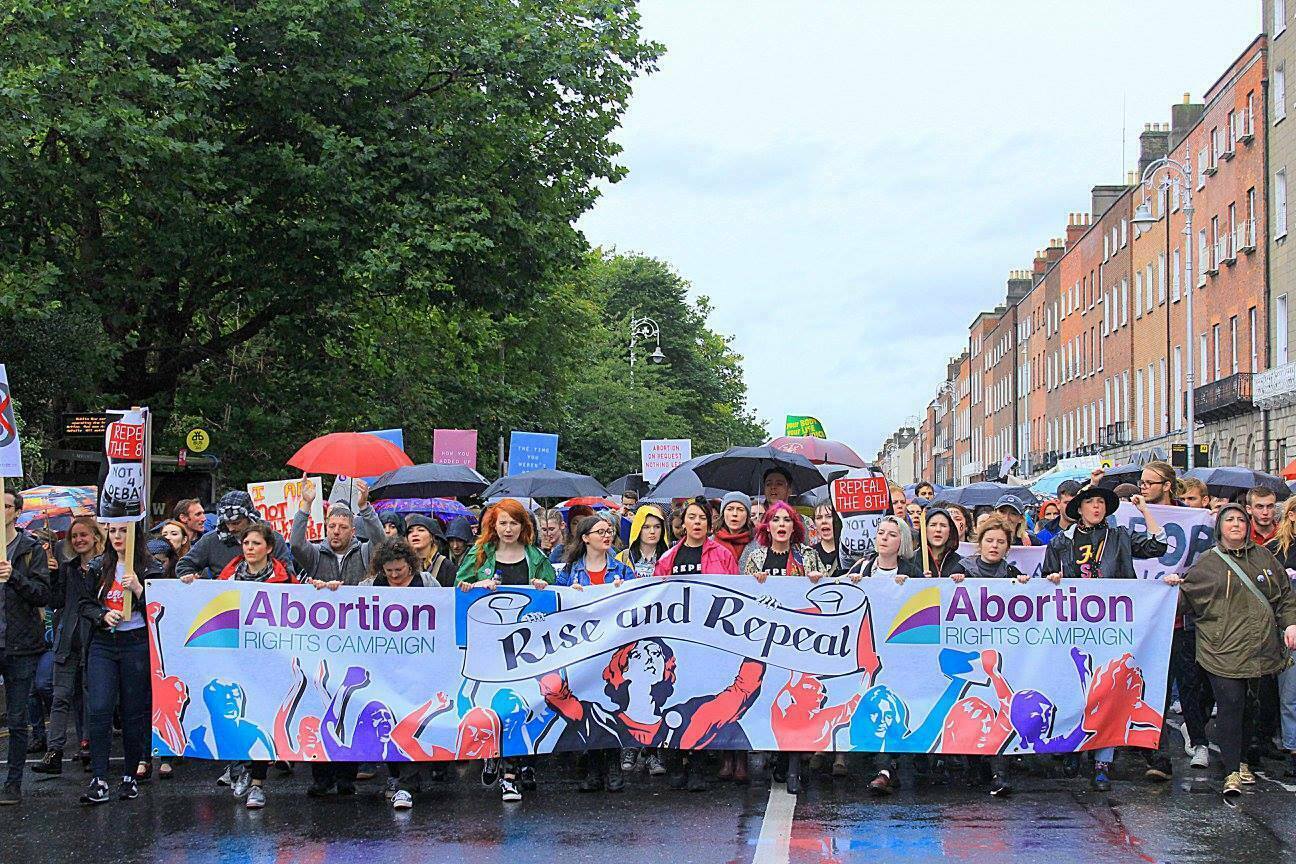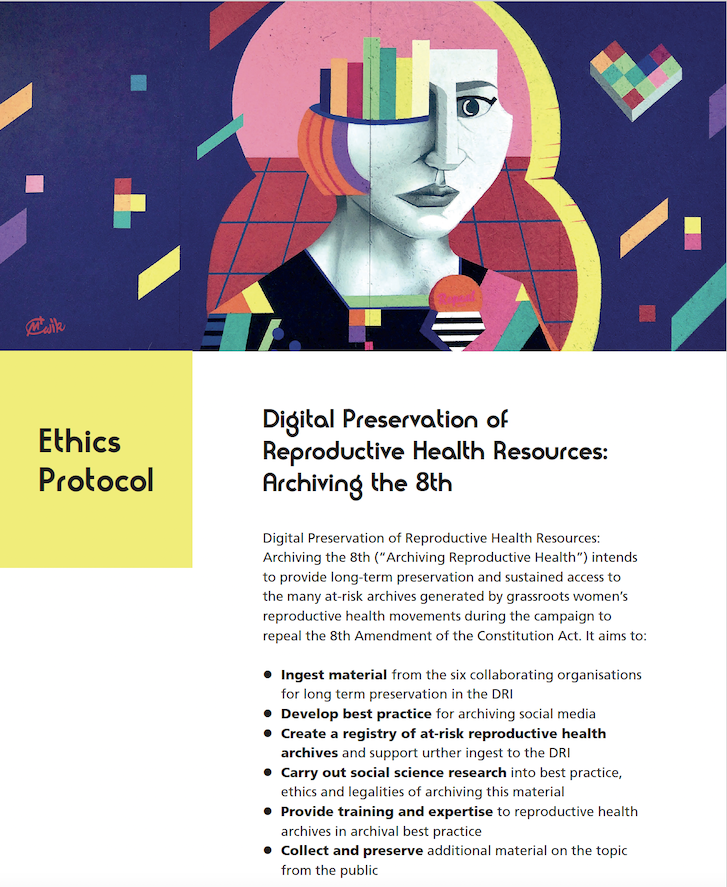Unit II: Ethics, Legal and Moral Frameworks
2.8 Archiving Reproductive Health
This case study is written by Clare Lanigan. The page is designed by Anna Villarica.
|
|
 |
 |
Overview
Archiving Reproductive Health (ARH) is a Wellcome-funded project coordinated by the Digital Repository of Ireland, which is working to preserve digital material created by grassroots organisations working for reproductive justice in Ireland, especially during the 2018 referendum to repeal the Eighth Amendment of the Irish constitution. To date, Archiving Reproductive Health has published collections from key organisations that were involved with the campaign, and a range of oral history interviews with feminist and reproductive rights activists working in Ireland over the last 40 years. The project will continue until the end of 2023 and the collections it creates are safely deposited in the Digital Repository of Ireland for the long term.
The Digital Repository of Ireland (DRI) is a national Trustworthy Digital Repository (TDR) for Ireland’s humanities, cultural heritage, and social sciences data. DRI has been certified by the CoreTrustSeal since 2018, building on our established role as a TDR. We support best practice in digital archiving, digital preservation, Open Access, Open Research, and FAIR data sharing. The DRI has pioneered the implementation of FAIR (Findable, Accessible, Interoperable, Reusable) data principles in Ireland in the context of a trustworthy and certified repository for social sciences and humanities data.
Some FAIR data policies used by DRI and ARH include: consistent application of persistent identifiers including DOIs and ORCIDs, rich and standardised metadata that is indexed and searchable, promoting the use of vocabularies, and licences for reuse. In September 2022 Archiving Reproductive Health won a Digital Preservation Award, the prestigious National Records of Scotland Award for Safeguarding the Digital Legacy. This award celebrates initiatives for the practical application of tools to protect at-risk digital objects.
Context
The Eighth Amendment
 |
|
March for Choice, 2016 by Renee Summers, taken from the front of the march, showing a row of Abortion Rights Campaign activists holding a large banner. (Source: DRI) |
Many countries around the world have seen mobilisations of people for progressive change in recent years, and Ireland is no exception. In 2018, the Irish public voted in a referendum to repeal the Eighth Amendment to the Irish Constitution. The Eighth Amendment, enacted by another referendum in 1983, placed a constitutional block on the right to legal abortion care in Ireland (although women in Ireland continued to travel to Britain and other places to access abortion care).
When the referendum took place, on 25 May 2018, it passed by 66.4%, with every constituency but one returning a majority Yes vote. Together for Yes disbanded after the referendum, and the various groups focused on the implementation of legislation. In January 2019, the Health (Regulation of Termination of Pregnancy) Act 2018 was enacted, making elective abortion care legal in Ireland for the first time in the nation’s history.
In the lead-up to the referendum, there were a number of campaigns from grassroots organisations and volunteers which took place primarily over social media. In particular, a number of initiatives emerged whose aim was to tell stories of personal experiences of abortion. These collected and published stories from ordinary women, giving a voice to a previously silent group, and developing a public capacity to empathise with their experiences. One such initiative is the In Her Shoes Facebook page. Preserved in ARH’s Core Collections, In Her Shoes is particularly important to archive as it captures personal ‘hidden histories’, the silent suffering of women, the shame and stigma associated with abortion and captures a time of emerging social change.
Social justice movements and the digital
Social justice movements in recent years rely heavily on digital content, which is vulnerable to loss and decay as physical material (in some cases more so). Moreover, there is no consensus on the best practice for archiving social media posts, hosted as they are on a variety of platforms each with their own rules about exporting and reposting content elsewhere. The rich record of how this referendum campaign unfolded, and of how volunteers and community groups contributed to the national conversation, is at real risk, therefore, of being lost to us forever as social media accounts close, platforms change or go out of business or we simply lose track of where the information exists.
Archiving Reproductive Health intends to provide long-term preservation and access to the many at-risk archives generated by grassroots women’s reproductive health movements during the campaign. The work ARH is carrying out ensures that part of this story of Irish recent history is preserved for future generations to learn from. Those who took part in the campaign, including people who told their stories of the experience of being unable to access abortion care in Ireland, have the record of their stories and lived experience preserved and recognised. The ARH project is partially motivated by a desire to circumvent institutional 'forgetting;' which too commonly happens around grassroots social movements. We also believe that traditionally women’s organisations have largely been excluded from archives and the focus of the project is to collect and preserve women’s experiences. The research we have carried out, not only on the technical challenges, but also on the complex issues of copyright, licensing and data protection with recent digital material, will hopefully help future projects carrying out similar work.
Core Collections
|
ARH is preserving collections of design and publicity material from activist groups, as well as a sequence of stories from the popular Facebook page ‘In Her Shoes’. Research data collections in the form of oral history interviews with medics, campaigners, and women’s rights activists are also collected. These provide important records of the lived experiences of activists and people affected by issues of reproductive inequality in Ireland. The project is continuously publishing material over the course of its operations in 2022 and 2023. Much of the material will already be familiar to the public from the 2018 referendum campaign, but the scheduled publication of administrative documents such as meeting agendas, strategic plans and annual reports gives the public richer and deeper context, as well as providing an invaluable resource for researchers. Explore the slider to get an overview of the key stakeholder organisations that ARH is collecting material from and the various collections. |
Administrative documents
The second tranche of published material in the ARH project focuses on publications and administrative documents created by stakeholder organisations, including reports, policy papers, and general meeting agendas and minutes from the Abortion Rights Campaign, and policy publications from Together for Yes and Terminations for Medical Reasons. The evolution of the Campaign to Repeal the Eighth Amendment can be traced through submissions to international bodies such as the Commission for the Elimination of Discrimination against Women (CEDAW), to public consultations held by the Irish government, and through collections of testimony from ordinary people affected by the Eighth Amendment.
Additional Collections
A number of additional collections have also been preserved as part of the ARH project. These include material by other volunteer organisations, researchers and campaigning groups.
The voices of activists from the past are heard in a series of oral history interview transcripts, taken from interviews with reproductive rights activists in Ireland in the 1980s and 1990s, crucial years for the development of the Irish pro-choice movement. These interviews were conducted by scholars and activists Linda Connolly and Mary Muldowney, and their inclusion in the Archiving Reproductive Health project adds to present and future researchers’ understanding of this period. More recent activists’ voices come from qualitative data compiled by academic Camilla Fitzsimons, from questionnaires conducted in 2015, 2020 and 2021, which provide insights into activists’ thinking on campaigning pre and post the 2018 referendum. Click on the (i)nformation icons below to learn more about the additional collections:
Public Collection Day
Archiving Reproductive Health, in partnership with Archives Ireland and Informa, held a Public Collection Day in Dublin City Library and Archive, Pearse St, Dublin, on 10 March 2023. This event was part of the public outreach aspect of ARH, and at the event we worked to digitise a cross-section of personal memorabilia relating to the history of the Eighth Amendment, and of reproductive health in Ireland more generally, over the last few decades.Members of the public applied to take part in a one-day event in Dublin on 10 March 2023. At this event, the successful applicants brought material which was digitised on-site by expert staff from Archives Ireland and Informa, or was transferred to DRI’s servers using secure file transfer.
DRI staff worked with applicants to collect important information about the material, which was then used for cataloguing. After the event, the digitised material is being published on DRI as part of the ARH collection, ensuring it is preserved in the long-term. Applications were open to everyone, and we sought material relating to any aspect of the history of the Eighth Amendment and the history of reproductive health and activism in Ireland more generally. Explore the dropdown for samples of the collections published from material digitised on the Collection Day:
Publications and Resources
Ethics Protocol
 |
|
Photo of the first page of The Ethics Protocol. |
The project team developed an 'Ethical Protocol' for the project spelling out the ethical challenges and clearly explaining our decisions to addressing each of these challenges. The purpose of the protocol are (1) to ensure the quality and integrity of our research and archiving processes, (2) to outline the ethical issues which arise from this project and provide solutions to these challenge, and (3) to ensure transparency in the project.
The protocol was published alongside the initial launch of the collection on 8 March 2022. Secondly, in order to inform those who had posted to the Facebook page, we developed an FAQ document explaining the archiving procedure and what we are planning to do. This information was posted on the ‘In Her Shoes’ Facebook page and our website. It outlined that the posts on the page were being archived and answered the following questions: what will this mean? Why are we doing this? And what do I need to do? We have a contact email for anyone who had any questions or concerns about the project but we have not received any emails to date.
There have been no queries or requests for the take-down of any story to date. Those who request access to the collection must agree a legal agreement on the DRI repository website (End User Agreement) which states that they must ‘agree to use the digital objects only in accordance with this End User Agreement’ and ‘ensure that full compliance with all data protection laws is observed when the digital objects, or derived material, are published or presented in a public forum.’
Guide to archiving for community groups
ARH has also published the ‘Guide to archiving digital records for volunteer and community groups’, a resource of clear, easy to follow and accessible instructions and advice for small organisations with limited resources, enabling them to make the best use of what resources they have and to preserve a cross-section of their digital records.
ARH Researcher Self-Care Protocol
In addition, a Self-Care Protocol for Archivists and Researchers has been developed by Dr Lorraine Grimes, the primary researcher on this project. The Self-Care Protocol includes practicalities for working with sensitive or traumatic data. It focuses on the potential to harm the researcher when working with sensitive data on reproductive health. Researchers working with collections within this project are encouraged to develop their own Self-Care protocols.
Conference presentations
At the Archives Society of Alberta Biennal conference ‘Care for People in the Archives’ in Edmonton, Canada, Clare Lanigan and Lorraine Grimes presented ‘Developing a self-care protocol for working with potentially traumatic data: the Archiving Reproductive Health experience’. The presentation slides are below:
Bibliography
Those interested in the topic may also consult the resources listed below:
- Archiving Reproductive Health (ARH) has published its final report and guide to collections here
- Postdoctoral Researcher and Digital Archivist Lorraine Grimes has developed a bibliography of sources in the area of research ethics, and working with sensitive and potentially traumatic research in the field of arts, humanities, and social sciences. This bibliography can be accessed on Zotero at this link: https://www.zotero.org/archivingreproductivehealth/collections/JRR6ZQP2/
- The Archiving the 8th project, which ran in University College Dublin in 2020 and 2021, also created an interactive Zotero library that comprises a comprehensive list of academic articles associated with the lifespan of the Eighth Amendment. This bibliography can be accessed on Zotero at this link and new contributions are welcomed: https://www.zotero.org/archivingthe8th/library
Author Bio*:
Clare Lanigan is a Digital Archivist and Coordinator for the Archiving Reproductive Health (ARH) project at the Digital Repository of Ireland. ARH is working on preserving the digital records of grassroots reproductive justice and women's health organisations in Ireland, especially those formed around the time of the repeal of the Eighth Amendment in 2018.
Designer Bio*:
Anna Villarica is a research assistant on the #dariahTeach project. She is a junior lecturer at Maastricht University currently teaching courses on design thinking, digital transformations, the philosophy of technology, research skills, and museology. She received her MA in Media Studies Digital Cultures from Maastricht University and her BA in Communications and New Media from the National University of Singapore. While she does not specialise in anything (yet), she loves all things digital and is always learning and creating.
*Bios and affiliations are accurate at the time of writing

